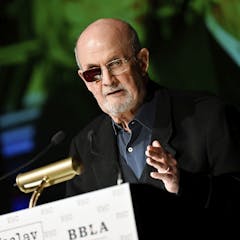
Articles on Book reviews
Displaying 1 - 20 of 504 articles

A classic Nicholls tale of unlikely lovers finding each other but with a post-pandemic twist.

Safe Haven is an excoriating account of a shameful period of Australian history, told in a life-affirming voice that imagines a more humane future.

Two vengeful women in love, a daughter on a mission to save her father, female spies and two ambitious wives.

Scott Morrison’s Plans for Your Good is part political memoir, part self-help book, and very strange.

The new 00s are back in a mission to stop a network of international smugglers and rescue Britain’s greatest spy, James Bond.

In her new memoir Hope, Rosie Batty reflects on her ‘absolute despair’ at our failure to protect women and children from gendered violence – and the personal toll of becoming an unlikely campaigner.

McDermid artfully weaves Shakespeare’s Lady Macbeth with Scotland’s Queen Gruoch, the real woman who inspired her.

Edwina Preston approaches Nova Weetman’s ‘generous and open’ grief memoir from a place of shared loss.

An 8000-km hitchhiking trip is at the heart of Anna Broinowski’s Datsun Angel. Dominic Gordon, in contrast, kicks his young self around Melbourne’s alleys like a half-squashed can of energy drink.

For poet Robert Adamson, the natural world offered a form of deliverance.

Rushdie feared until he dealt with the attempt on his life, he ‘wouldn’t be able to write anything else’. The book is a clearly cathartic story of courage and resilience, but it’s curiously one-eyed.

Two fascinating new novels are not particularly difficult, but their relationship to established traditions of experimental literature is clear.

A new book paints intricate portraits of plant and animal species, showing how they are woven into their ecological setting and describing how that weave is unravelling.

The debut novels of two forceful, intelligent journalists are bold, brash stories of powerful women at the top of their game. One details a horrific sexual crime, the other ugliness in the art world.

Storyselling, unlike narration, attempts to eradicate uncertainty. It cannot perform the important task of imagining the future.

In Black Duck, Bruce Pascoe traces a calendar year on Yumburra, the farm his bestseller Dark Emu helped to purchase.

The End of the Morning is Charmian Clift’s most successful piece of fiction. But it is only a piece and one that leaves two matters unresolved.

Donor conception, surrogacy, artificial womb technologies … a new book delves into how families are changing.

Winnie Dunn has made it her project to bring a more sensitive intercultural understanding to an unfamiliar readership

Writer and psychotherapist Adam Phillips is often hailed as one of the world’s great essayists. His new book – exploring the topic of giving up, among other things – is both erudite and slippery.
